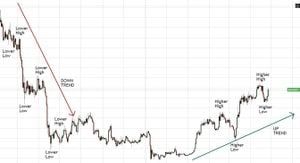The Indian stock market is grappling with significant declines as major indices have suffered considerable losses over the past few days. The Sensex, which reflects the performance of the top companies on the Bombay Stock Exchange (BSE), closed at 74,454, down 857 points, representing a fall of 1.14%. Similarly, the Nifty 50, which is tracked by the National Stock Exchange (NSE), dropped by 243 points to close at 22,553. Reports indicate this streak of declines raises concerns among investors, particularly as notable sectors like IT and metals experienced the largest sell-offs.
The past week has seen the Indian stock market endure pressure primarily due to weak global cues. For five consecutive days, significant sell-offs have been observed, influenced by skepticism surrounding geopolitical risks and inflationary pressures. Trading sessions have shown a disheartening trend where one stock rises for every three stocks declining. The Indian market's capitalization has decreased by approximately $1 trillion since October 2024, as indicated by analysts.
Market experts are pointing to multifaceted reasons for the prolonged slump. An array of factors including the declining sentiment for IT shares and fluctuates caused by changes throughout the global markets has urged investors to rethink their strategies. Companies like Infosys, TCS, and HCL Tech have suffered declines of up to 3.7%, pushing the Nifty IT index down remarkably.
The sell-off reflects broader market forces at play as foreign investors react to economic uncertainties. According to market analysts, the recent trading behavior suggests investors are shifting their approach from buying on dips to selling on rallies. This shift reflects diminished confidence, with many investors choosing to adopt strategies focusing on less volatile stocks.
On Monday, February 24, the Nifty Bank also saw a sharp fall, declining by 329 points to end at 48,652, corroborated by the broader decline witnessed across various sectors. The Nifty midcap index faced 473 points drop, showing continued angst among investors.
Appearing to counterbalance these losses, parts of the FMCG sector managed to stay afloat. Notable gains were reported from companies linked with fast-moving consumer goods, showcasing their resilience amid challenging times.
Promoter stake sales have added to the pressure on investor sentiments. Notably, EPL's shares plummeted by more than 8% after reports of stake selling surfaced, highlighting growing concerns over market stability.
Global market trends have also exerted influence over Indian markets, with notable declines observed across US stock indices—Dow Jones dropped by 1.69%, reflecting similar sentiments. Weakness was seen mirrored across regions, including Asian and European markets, adding to fears of sustained volatility. The international financial climate paints a concerning picture, with investors wary of fluctuators prompting unpredictable trading patterns.
According to reports by various analysts, the current trend if sustained could pave the way for what would be the longest consecutive decline witnessed since 1996. Concerns grow as this sequence threatens to continue if external market forces exacerbate existing vulnerabilities. The suggestion looms large on whether the continued bearish pressure could become part of Indian market history.
Adding fuel to the fire is the dark possibility of recession-related cost pressures. Investors are being urged to shift focus toward more stable companies, particularly within sectors defined by less volatility. Private lenders including HDFC Bank and ICICI Bank are increasingly becoming preferred stocks as their reliability counters market uncertainties.
The broader ecological environment is also urging investors to diversify their portfolios, with significant recommendations to invest approximately 25% of assets toward gold, perceived as stable and safe against the backdrop of economic instability.
Investment strategies are rapidly adapting as investors navigate through this challenging period. Shifting strategies to prioritize quality stocks and sectors exhibiting strong economic fundamentals has become the order of the day.
With the market continuing to reel from the recent declines, analysis indicates the necessity for vigilance among retail investors, who often feel the brunt of market impacts. The focus on investment strategy adjustment showcases the agility of market participants amid shifting tides.
Despite the current tumultuous environment, market experts believe there remains room for recovery. Historical trends suggest markets can rebound quickly from downturns, though historical performance is no guarantee of future results.
Overall, the sentiment across the Indian stock market remains tense as participants keep watch on global cues and domestic policy adjustments. The long-term outlook may hinge on external markets stabilizing, with hopes for regaining investor confidence dwindling amid increased selling pressure.



